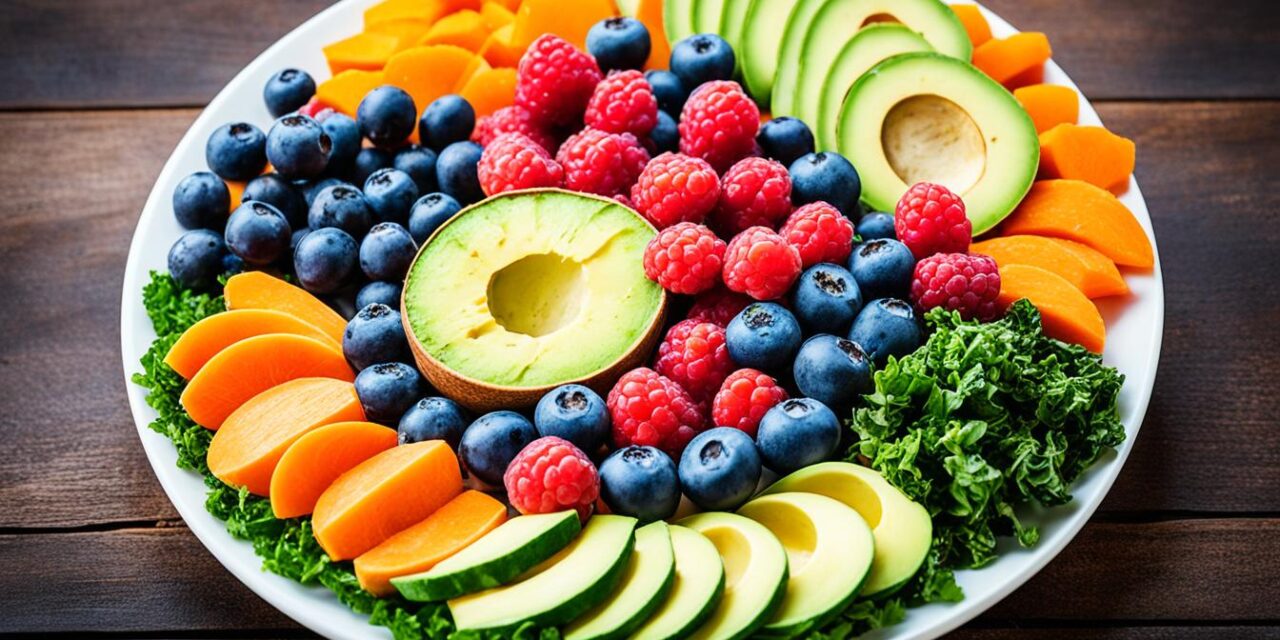Depression is a widespread mental health condition that affects millions of people worldwide. While professional treatment is essential for managing depression, research has shown that incorporating specific nutrients into your diet can help support mental well-being. These depression-fighting nutrients, also known as natural mood boosters, have the potential to improve brain health and alleviate mood disorders.
Curious to know which nutrients can have such a positive impact on your mood? Let’s explore five key nutrients that have been found to fight depression and boost your mood naturally.
Key Takeaways:
- Omega-3 fatty acids, found in fatty fish, can help lower levels of depression.
- Dark chocolate contains mood-boosting compounds and flavonoids that support brain health.
- Fermented foods, like kimchi and yogurt, provide probiotics that enhance gut health and serotonin production.
- Bananas are rich in vitamin B6, which aids in the synthesis of mood-boosting neurotransmitters.
- Berries, such as blueberries and strawberries, are packed with antioxidants and can reduce the risk of depression symptoms.
Omega-3 Fatty Acids
When it comes to fighting depression and boosting your mood, omega-3 fatty acids are a game-changer. These depression-fighting nutrients are a key component of brain health and play a crucial role in brain development and cell signaling (1). Specifically, the omega-3 fatty acids docosahexaenoic acid (DHA) and eicosapentaenoic acid (EPA) have been linked to lower levels of depression (2).
Fatty fish like salmon and albacore tuna are excellent sources of omega-3s. By consuming a sufficient amount of these mood-boosting vitamins, around 250-500 mg of combined EPA and DHA per day, you can improve your overall brain health and support mood regulation (3).
| Food Source | EPA + DHA Content (per 3 oz serving) |
|---|---|
| Atlantic Salmon | 1,200-2,400 mg |
| Albacore Tuna | 900-1,500 mg |
| Sardines | 1,000-1,400 mg |
| Mackerel | 700-1,100 mg |
By incorporating these omega-3-rich foods into your diet, you can harness the power of these depression-fighting nutrients and experience a positive impact on your mood (4).
Omega-3 fatty acids: the natural mood boosters your brain needs to keep the blues away!
How Omega-3 Fatty Acids Improve Mood
Omega-3 fatty acids contribute to the fluidity of cell membranes in the brain, allowing for efficient communication between brain cells. This plays a vital role in mood regulation and overall brain health. Additionally, omega-3s have anti-inflammatory properties, reducing inflammation that may contribute to depression (5).
- Improves brain cell communication
- Reduces inflammation in the brain
- Promotes overall brain health
Research has shown that individuals who consume adequate amounts of omega-3s are less likely to experience symptoms of depression and have a more positive mood overall (6).
So, next time you’re planning your meals, don’t forget to include some omega-3-rich foods to give your brain the nourishment it needs for optimal mood and well-being!
References:
(1) Harvard Health Publishing: Nutrition and mental health
(2) Grosso, G., & Galvano, F. (2016). Mediterranean Diet and Depression: A Systematic Review. Nutrients, 8(2), 1–11.
(3) National Institutes of Health: Omega-3 Fatty Acids – Fact Sheet for Health Professionals
(4) Scientific Reports: Associations of fish and omega-3 fatty acid intake with depressive symptoms and negative outlook in the UK Women’s Cohort Study
(5) Kiecolt-Glaser, J. K., Belury, M. A., Andridge, R., Malarkey, W. B., & Glaser, R. (2011). Omega-3 supplementation lowers inflammation in healthy middle-aged and older adults: A randomized controlled trial. Brain, Behavior, and Immunity, 25(8), 1725–1734.
(6) Appleton, K. M., Sallis, H. M., Perry, R., Ness, A. R., & Churchill, R. (2018). Omega-3 fatty acids for depression in adults. Cochrane Database of Systematic Reviews, 7.
Dark Chocolate
Indulging in a small square of rich, dark chocolate has more benefits than just satisfying a sweet tooth. Dark chocolate is not only a delightful treat but also one of nature’s natural mood boosters. Packed with mood-boosting compounds such as caffeine, theobromine, and N-acylethanolamine, it has the potential to uplift your spirits in a delectable way.
But there’s more to dark chocolate than its flavor. It’s the abundance of flavonoids that truly sets it apart as a mood enhancer. Flavonoids, the antioxidants found in dark chocolate, have been shown to increase blood flow to the brain and reduce inflammation, supporting optimal mood regulation.
To fully reap the mood-boosting benefits of dark chocolate, opt for varieties that contain at least 70% cocoa solids. These have a higher concentration of flavonoids and a lower amount of added sugar. Remember, a little goes a long way, so indulge in a small piece of dark chocolate as a treat, savoring each delectable bite.
The Science Behind Dark Chocolate’s Mood-Boosting Magic
“Dark chocolate: Making your taste buds happy and your mood soar!”
| Compound | Purpose |
|---|---|
| Caffeine | Provides a mild stimulant effect, boosting energy and focus. |
| Theobromine | A natural compound that promotes relaxation and acts as a mood enhancer. |
| N-acylethanolamine | Stimulates the production of endorphins, the brain’s feel-good chemicals. |
| Flavonoids | Increase blood flow to the brain, reduce inflammation, and improve mood regulation. |
So, the next time you find yourself in need of a little pick-me-up, reach for a piece of dark chocolate. Its delightful taste and mood-boosting properties make it a perfect choice for a guilt-free indulgence that can leave you feeling happy and satisfied.
Fermented Foods
When it comes to improving your mood naturally, you may be surprised to learn that fermented foods can play a role. Foods like kimchi, yogurt, kefir, kombucha, and sauerkraut are not only delicious but also packed with depression-fighting nutrients and serve as natural mood boosters.
So, what makes fermented foods so special? Well, it’s all about the probiotics. These foods are rich in probiotics, which are beneficial bacteria that support gut health. And guess what? Up to 90% of the body’s serotonin, the neurotransmitter responsible for regulating mood, is produced in the gut. A healthy gut microbiome has been linked to lower rates of depression, so taking care of your gut is essential for your mental well-being.
The fermentation process in these foods creates those wonderful probiotics, which can help increase serotonin levels and improve your mood. By including fermented foods in your diet, you are not only adding a burst of flavor to your meals but also giving your mental health a boost.
So go ahead, indulge in some tangy sauerkraut, sip on a refreshing kombucha, or enjoy a creamy bowl of yogurt. Your taste buds and your mood will thank you!
Benefits of Fermented Foods:
- Rich in probiotics that support gut health
- Boost serotonin levels and improve mood
- Contribute to a healthy gut microbiome
- Lower rates of depression
- Provide a burst of flavor to meals
Expert Opinion:
“The gut-brain axis is a powerful connection, and by nourishing your gut with fermented foods, you’re taking a proactive step towards enhancing your mental well-being. These foods not only provide essential nutrients but also support a healthy balance of gut bacteria that can positively influence your mood.”
Bananas
When it comes to lifting your spirits, look no further than bananas. These vibrant yellow fruits pack a powerful punch when it comes to boosting your mood naturally. Loaded with essential nutrients, bananas are known for their mood-boosting vitamins that can help regulate your emotions and keep you feeling upbeat throughout the day.
One of the key mood-boosting vitamins found in bananas is vitamin B6. This essential nutrient plays a crucial role in synthesizing neurotransmitters like dopamine and serotonin, which are known as mood-boosting chemicals. By ensuring an adequate intake of vitamin B6, you can support the production of these vital neurotransmitters and enhance your overall mood.
But that’s not all! Bananas also provide a natural source of sugars and prebiotic fiber. These nutrients help stabilize your blood sugar levels, preventing energy crashes and maintaining steady energy throughout the day. Additionally, the prebiotic fiber in bananas nourishes your gut microbiome, promoting a healthy digestive system. As up to 90% of the body’s serotonin, a key neurotransmitter influencing mood, is produced in the gut, maintaining a healthy gut microbiome is essential for your mental well-being.
So, how can you incorporate bananas into your diet to enjoy their mood-boosting benefits? It’s easy! You can enjoy a ripe banana as a quick snack on its own, or add it to your morning cereal, smoothies, or even bake it into delicious treats. The versatility of this fruit makes it a convenient and tasty addition to any meal.
Remember, when it comes to banishing the blues, bananas are your go-to natural mood boosters. So go ahead and indulge in this nutritious and delicious fruit to keep your spirits high and your mood soaring!
Berries
When it comes to combating depression and boosting your mood naturally, don’t overlook the power of berries. These small fruits pack a punch, loaded with depression-fighting nutrients and mood-boosting vitamins that can make a big difference in your mental health.
One of the key reasons why berries are so beneficial is their high antioxidant content. Berries, such as strawberries, blueberries, and raspberries, are rich in antioxidants and phenolic compounds that help combat oxidative stress in the body. By reducing oxidative stress, these compounds contribute to lower rates of depression and improved mental well-being.
Moreover, berries are also known for their vibrant colors, thanks to a group of plant pigments called anthocyanins. These compounds have been linked to a lower risk of depression symptoms, highlighting the mood-boosting properties of these delicious fruits.
So how can you incorporate berries into your diet? Here are some ideas:
- Add a handful of berries to your morning cereal or smoothie.
- Snack on fresh berries throughout the day for a satisfying and nutritious treat.
- Use berries as a topping for yogurt, salads, or desserts.
- Blend berries into a homemade fruit sauce or jam.
- Freeze berries to enjoy as a refreshing snack or ingredient in smoothies.
| Berry | Antioxidant Content | Anthocyanin Content |
|---|---|---|
| Strawberries | High | High |
| Blueberries | High | High |
| Raspberries | Moderate | High |
Include berries in your daily diet to reap the benefits of these depression-fighting nutrients and mood-boosting vitamins. Make sure to choose fresh, organic berries whenever possible to maximize their nutritional value. Berries are not only delicious but also a natural and enjoyable way to support your mental well-being.
Conclusion
While food can’t cure depression or replace professional treatment, incorporating the right nutrients into your diet can contribute to improved mental well-being. Along with a balanced diet, lifestyle factors like regular exercise, quality sleep, and stress management play crucial roles in maintaining good mental health.
By focusing on holistic nourishment and incorporating natural mood-boosting supplements and foods, you can take steps towards enhancing your mood and overall mental health. Remember, it’s always a good idea to consult with a healthcare professional before making significant changes to your diet or treatment plan.
So, boost your mood with omega-3 fatty acids found in fatty fish, indulge in a small piece of dark chocolate for its mood-boosting compounds, and enjoy fermented foods that support a healthy gut microbiome. Additionally, don’t forget the benefits of vitamin B6 from bananas and the antioxidant-rich power of berries.
Prioritize your mental well-being by incorporating these natural remedies for depression into your lifestyle. Remember, every little step counts when it comes to improving your mood!
FAQ
Can certain nutrients help fight depression and boost mood naturally?
What are omega-3 fatty acids and how do they help with depression?
How does dark chocolate contribute to boosting mood?
How do fermented foods support mental health?
What role do bananas play in boosting mood?
How can berries contribute to improved mood?
Can these nutrients alone cure depression?
MORE SOURCES TO READ:
- https://www.healthline.com/nutrition/mood-food
- https://www.gleneagles.com.sg/health-plus/article/mood-boosting-foods
- https://communityhealth.mayoclinic.org/featured-stories/mood-boosting-foods
![]()














Recent Comments